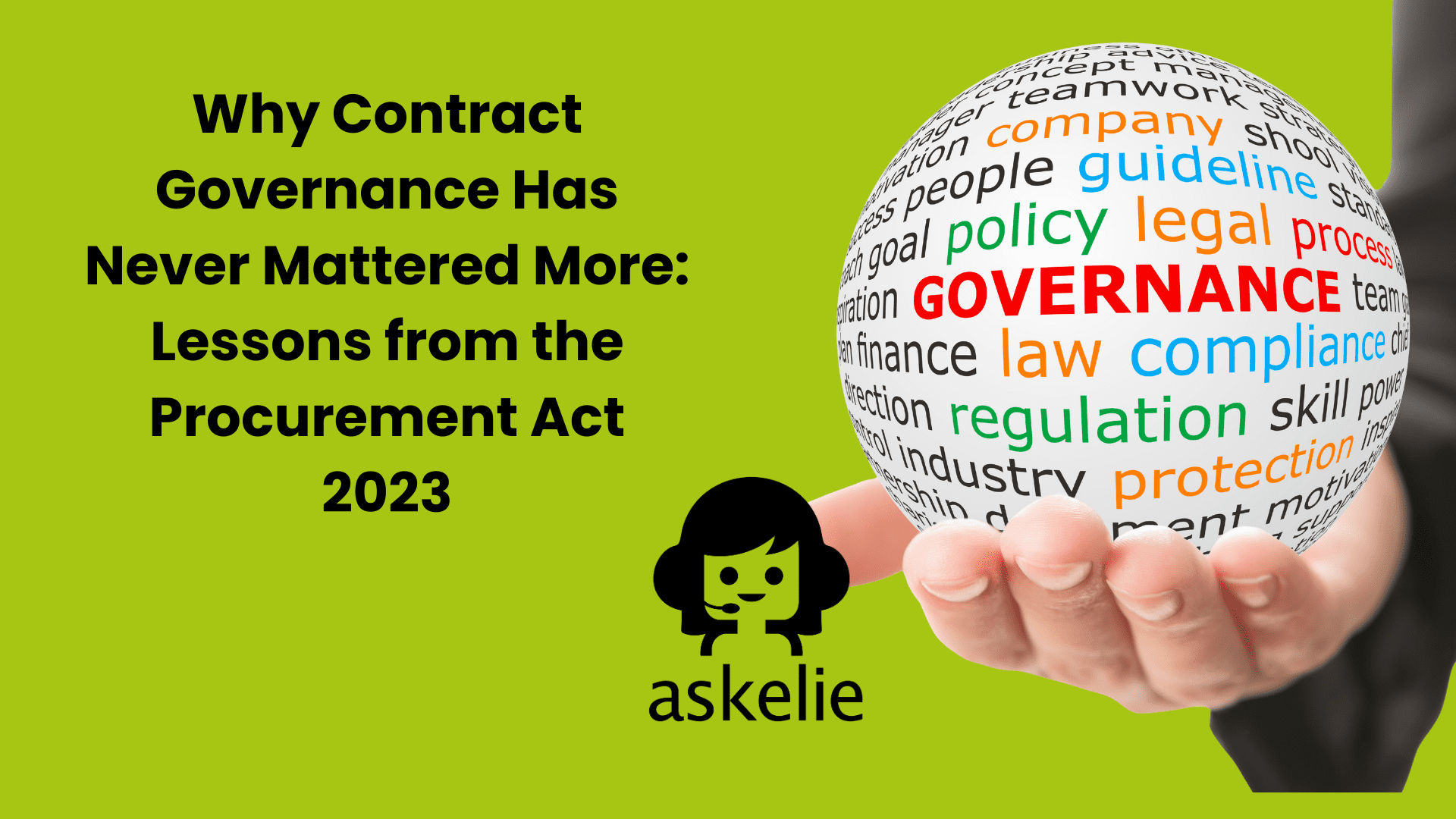Contract governance defines how organisations manage the contracts that shape their income, spending, and risk. The Procurement Act 2023 has raised the bar for transparency and accountability, forcing both public and private organisations to rethink how they control supplier performance, obligations, and cost. For every business that depends on partners, vendors, or service providers, effective contract governance is now a compliance requirement and a performance advantage.
Why Contract Governance Matters
Contracts are the foundation of every organisation. Around 60 percent of spend is tied to suppliers through contracts, and more than 90 percent of income sits within contractual frameworks. Yet despite their importance, contracts are often managed in silos. Legal teams, procurement, finance, and operations each work from different data sources. Clauses are stored in folders, renewals sit in inboxes, and no single view exists across the entire contract landscape.
The result is inefficiency, missed obligations, and unnecessary risk. Renewal dates slip by unnoticed. Payments are made without value review. Suppliers underperform but continue unchecked. These are not minor administrative issues,they directly affect cost control, compliance, and trust.
Strong contract governance replaces this fragmentation with visibility and accountability. It provides a framework that connects every stakeholder, enforces consistency, and keeps contracts aligned with strategic goals.
The Procurement Act 2023: Raising the Standards
The Procurement Act 2023 introduces a new legal framework that prioritises transparency, performance, and fairness. The key requirements directly impact how contracts are governed:
- Transparency – Procurement data must be published at each stage, from tender to completion.
- Prompt Payment – Buyers must pay suppliers within 30 days and ensure that payment timelines cascade through the supply chain.
- Performance Oversight – Authorities can exclude suppliers who fail to meet contractual standards.
- Auditability – Organisations must keep clear, accessible records of all procurement decisions and performance data.
This means that compliance now depends on data integrity. Organisations must prove that every contract is traceable, measurable, and managed in accordance with policy and law.
The Governance Gap
Many teams still rely on manual tools to track obligations and renewals. Without automation or shared visibility, governance breaks down. Typical symptoms include:
- Multiple contract repositories with inconsistent data
- No automated link between performance and cost
- Renewals processed automatically without review
- Payments made without measuring service value
- Limited collaboration between buyers and suppliers
These gaps cause overspending, performance drift, and compliance failure. To meet the demands of the Procurement Act and modern business models such as consumption-based pricing, organisations need systems that capture, track, and analyse contracts in real time.
From Contracts as Documents to Contracts as Data
The modern view of contract governance treats agreements as living data assets rather than static documents. When contracts are connected to financial systems, asset registers, and supplier portals, leaders gain complete visibility over performance, consumption, and cost.
askelie® has built this capability into ELIE for Contracts, a solution designed to unify contract management across legal, procurement, and operations. ELIE transforms contract governance from reactive oversight to continuous improvement.
How ELIE for Contracts Transforms Governance
ELIE for Contracts combines automation, collaboration, and AI-driven intelligence in a single platform. It streamlines the entire contract lifecycle—from intake and drafting through to review, approval, renewal, and performance analysis.
1. Centralised contract repository
All agreements, SLAs, KPIs, and supplier details are stored in one secure location, creating a single source of truth for every stakeholder.
2. Automated intake and validation
Contracts are captured automatically using the Capture platform. ELIE checks for missing clauses, non-standard language, and compliance gaps before approval.
3. Collaborative workflows
Procurement, finance, and legal teams work within the same interface. Approvals are routed by type, value, or risk profile, ensuring the right people see the right contracts at the right time.
4. AI-driven risk and performance monitoring
ELIE’s machine learning engine analyses performance data, identifies potential failures, and predicts risks before they occur. The platform links supplier contracts to sales or service agreements for a complete view of revenue and spend.
5. Renewals and obligation tracking
Automated reminders prevent renewals from being missed and highlight contracts that require performance review before extension.
6. Compliance and audit readiness
Every action is logged, creating an auditable trail for GDPR, ISO 27001, and sector-specific standards. Reports can be generated instantly for regulators, auditors, or leadership teams.
Collaborative Contract Governance Across the Business
ELIE for Contracts is built for cross-functional collaboration. Procurement teams manage supplier onboarding and renewals. Legal departments handle creation, risk review, and compliance audits. Finance tracks costs, budgets, and invoice alignment. Department heads can view performance dashboards and link assets to contracts under warranty. Suppliers and customers can interact directly through portals that provide shared visibility of performance and costs.
This structure eliminates silos and builds accountability. Every participant sees the same information, understands their obligations, and contributes to continuous improvement.
The Contract Sentinel Advantage
At the heart of ELIE for Contracts is our Ever Learning Intelligent Engine, the performance monitoring engine that measures risk, cost, and service quality. It provides:
- Full visibility of high- and low-performing suppliers
- Real-time tracking of consumption-based costs
- Insights into unused or overlapping services
- Transparent dashboards for spend and performance
- Improved supplier relationships through data-driven collaboration
By turning contract performance into measurable intelligence, organisations can identify savings, reduce duplication, and gain confidence that every supplier delivers value.
Key Benefits of Strong Contract Governance
For Clients
- Centralised dashboard and repository
- Faster contract turnaround from weeks to days
- Visibility of renewals, exit clauses, and SLAs
- Clear reporting for auditors and leadership
- Reduced administrative cost and complexity
For Suppliers
- Greater transparency for service performance
- Automation of routine tasks and compliance checks
- Faster approvals and renewals
- Stronger relationships built on data and trust
Five Governance Questions to Ask in 2025
- Do we have one location for all supplier contracts, SLAs, and KPIs?
- Are we reviewing supplier performance before renewals occur?
- Can we track consumption-based costs across all agreements?
- Do we measure and flag underperforming contracts automatically?
- Is our governance model collaborative, transparent, and audit-ready?
If the answer to any of these is no, the organisation is at risk of compliance failure or missed value.
From Compliance to Competitive Advantage
Strong contract governance delivers control, clarity, and collaboration. It ensures that every contract supports business objectives and that suppliers deliver measurable results. With the right tools, governance becomes an enabler of growth rather than a constraint.
ELIE for Contracts gives leaders this capability. It brings together automation, analytics, and human oversight to make governance efficient, transparent, and intelligent. By doing so, it helps organisations meet the demands of the Procurement Act while achieving faster cycle times, lower costs, and stronger compliance.
Contract governance is no longer about managing paperwork. It is about measuring performance, managing spend, and building trust. With askelie®, every agreement becomes an asset, controlled, measured, and delivering value.
Want to learn more? Contact us and ask for a demo.


